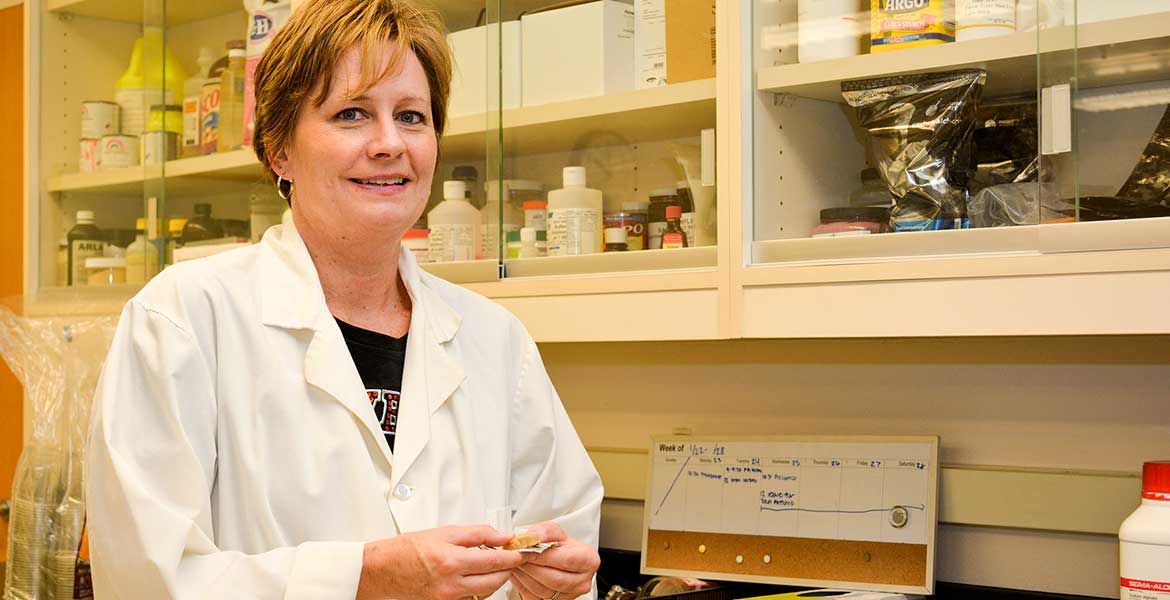
From PB Slices to a bite-size PB snack, FAPC researchers are changing the way people eat peanut butter
Thursday, February 21, 2019
The days of scooping peanut butter straight out of the jar with a spoon may be nearing an end.
Researchers at the Oklahoma State University’s Robert M. Kerr Food & Agricultural Products Center have developed a bite-size peanut butter product that is individually wrapped, high in protein and made from real peanut butter.
“These peanut butter snacks provide consumers with a convenient, healthy way of eating one of their favorite foods,” said Dani Bellmer, FAPC food processing engineer and co-inventor of the bites.
Bellmer and William McGlynn, FAPC horticulture processing specialist, began a peanut butter venture in the late 1990s. Their original creation, PB Slices, provided an easier way for consumers to make peanut butter sandwiches. After about a year on the market, the project fizzled out and the pair never pursued it again.
Years later, the specialists began looking to revamp the concept of PB Slices. Wanting to identify potential markets for their original product, the duo participated in the Oklahoma Proof of Concept Center, a statewide technology business accelerator program managed by Innovation Enterprise in Oklahoma City, to investigate the business opportunities for the peanut butter slice technology.
“After talking to food service providers, distributors and a wide array of demographics during the course, it became evident consumers were no longer interested in the original product,” McGlynn said. “The consumers who were most excited about the bite-size snacks were primarily fitness people looking for a healthy snack to incorporate into their busy lives.”
McGlynn said FAPC, a part of OSU’s Division of Agricultural Sciences and Natural Resources, assisted with the creation of the peanut butter snack in a number of ways. The center’s research laboratories, pilot-processing facilities, educational programs and seminars keep food and agricultural processors and entrepreneurs on the forefront of cutting-edge value-added processing and technology.
In addition, OSU’s Technology Business Development Program helped fund the product development work.
“Having all the pilot plant equipment under our roof was beneficial to do the formulations and make the prototype products,” McGlynn said. “The team took advantage of testing equipment and sensory evaluations in house as well.”
Reformulations of the product were completed at FAPC but locating a facility with the proper allergen permissions and appropriate equipment to form the snack-size bites was a challenge.
Cerreta Candy Co. in Glendale, Arizona, was able to give access to its facility for pilot runs of the product where the individually wrapped peanut butter bite samples were produced.
Overall, sensory evaluations of the test batches have been positive.
“In its current state, peanut butter is less convenient to eat than many other ready-to-eat products,” Bellmer said. “Once it is made into a snackable form, its consumption will likely increase.”
Additionally, nutritional and convenient snacks continue to climb the trends list in the food industry making the bite-size peanut butter snacks’ debut timely.
“People want a snack that they can eat on the go,” Bellmer said. “These peanut butter snacks can be eaten while students walk to class or as gym-goers head to their workouts.”
The bite-size peanut butter snacks also have additional protein supplements and provide controlled portions for snackers to enjoy. Each bite is made up of 80 percent peanut butter with added pea protein and peanut flour to make them higher in protein.
“You automatically have a defined and discrete portion that is prepared and ready to go,” McGlynn said. “No longer do you have to measure out each scoop to ensure you’re getting correct amounts of protein; we’ve done that for you.”
The commercialization of the bite-size snacks would benefit FAPC, OSU and the entire state of Oklahoma, Bellmer said.
“Peanut butter is a staple in the American diet with more than a million dollars in annual sales, and peanuts are an important crop in the state of Oklahoma,” she said. “Capitalizing on the popular crop gives us the opportunity to expand the peanut industry in Oklahoma, creating more jobs and revenue for the state.”
After three years of development, the team is searching for partners but has had “no big bites as of now,” McGlynn said.
“There are various avenues we can pursue, but ultimately, we hope you will see the bites on store shelves in the future,” he said.
Story By Tori Lock
FAPC Graduate Assistant
